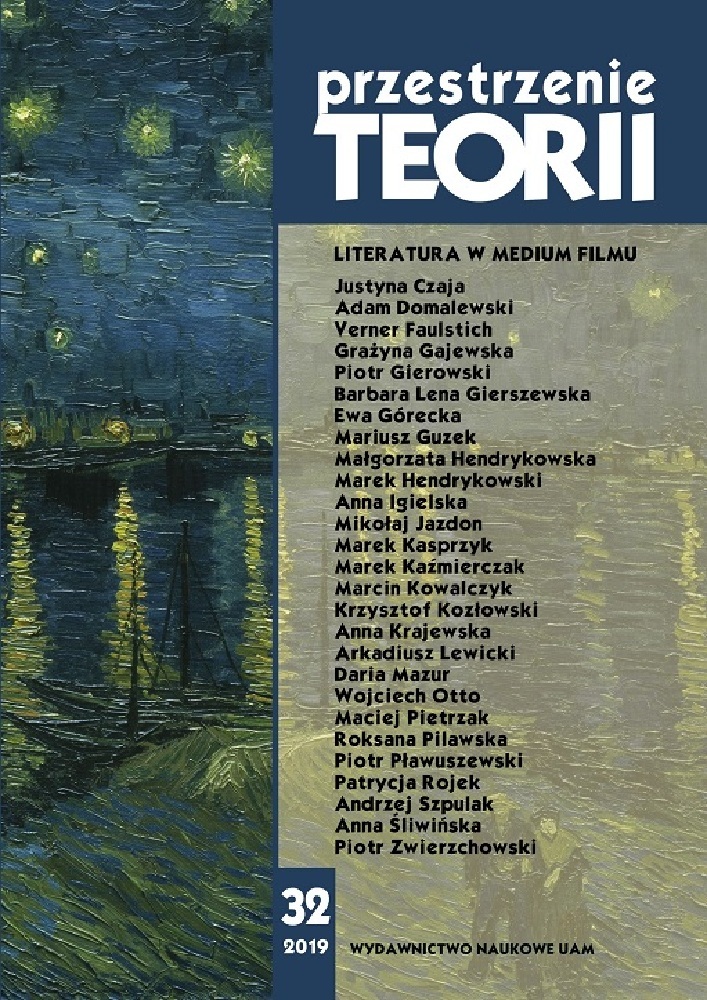Abstract
Otto Wojciech, Czytanie poety – widzenie poezji. O Wojaczku Lecha Majewskiego [Reading a Poet – Seeing Poetry. On Wojaczek by Lech Majewski]. „Przestrzenie Teorii” 32. Poznań 2019, Adam Mickiewicz University Press, pp. 285–300. ISSN 1644-6763. DOI 10.14746/pt.2019.32.15.
The film chronicles the last days in the life of Rafał Wojaczek, who committed suicide at the age of 26. This is the director’s vision that reflects the spirit and character of an artistic genius and his poetic work. Wojaczek is presented against the background of the grey, dirty and bleak communist reality of the late 1960s and early 1970s and therefore becomes a symbol of a rebellious artist, not reconciled with the world and with himself. His colourful character and no less impressive works
shown in the film create the image of an artist whose life led in a straight line and with absolute consistency towards self-destruction. By showing the poet’s rebellion against reality, the director describes the artist’s self-destruction that headed for a tragic end. The is a black and white film with many experimental form treatments.
References
Artysta innego czasu (z Lechem Majewskim rozmawia Barbara Hollender), „Rzeczpospolita” 1999, nr 260.
Jakubowska M., WOjaCZEK, czyli katalog ja. O filmie Lecha Majewskiego, [w:] tejże, Żeglowanie po filmie, Kraków 2006.
Jarocka A., Fabuła, obraz i dźwięk – strategiczna dezorientacja w filmie Lecha Majewskiego „Wojaczek”, „Images” 2008, nr 11–12.
Materkowski F., Fauna i flora w twórczości poetyckiej Rafała Wojaczka, <http://elartu.tntu.edu.ua/bitstream/123456789/8959/2/ProcNTShTB_2011v6_Materkowski_F-Fauna_i_flora_w_tworczosci_93-105.pdf> [dostęp: 28.12.2019].
Michałowska J., Filmowy tomik poezji – Wojaczek Lecha Majewskiego, „Kwartalnik Filmowy” 2001, nr 33, s. 2, <http://filmotekaszkolna.pl/dla-uczniow/materialy-filmoznawcze/filmowy-tomik-poezji-wojaczek-lecha-majewskiego> [dostęp:12.11.2019].
Putyńska U., Śmierć w kadrze. Szkic o WOjaCZKU Lecha Majewskiego, [w:] Szkice do Wojaczka, red. P. Śliwiński, Kraków 2015.
Zawojski P., Krótki sezon w piekle samotności, [w:] tegoż, Wielkie filmy przełomu wieków, Kraków 2007.
License
Authors
Authors of texts accepted for publication in Przestrzenie Teorii are required to complete, sign and return to the editor's office the Agreement for granting a royalty-free license to works with a commitment to grant a CC sub-license.
Under the agreement, the authors of texts published in Przestrzenie Teorii grant the Adam Mickiewicz University in Poznań a non-exclusive, royalty-free license and authorize the use of Attribution-NonCommercial-NoDerivatives 4.0 International (CC BY-NC-ND 4.0) Creative Commons sub-license.
The authors retain the right to continue the free disposal of the work.
Users
Interested Internet users are entitled to use works published in Przestrzenie Teorii since 2015, for non-commercial purposes only, under the following conditions:
- attribution - obligation to provide, together with the distributed work, information about the authorship, title, source (link to the original work, DOI) and the license itself.
- no derivatives - the work must be preserved in its original form, without the author's consent it is not possible to distribute the modified work, such as translations, publications, etc.
Copyrights are reserved for all texts published before 2015.
Miscellaneous
Adam Mickiewicz University in Poznań retains the right to magazines as a whole (layout, graphic form, title, cover design, logo etc.).
